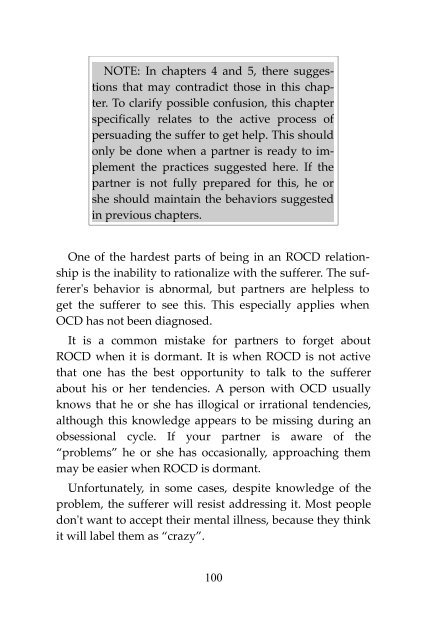You also want an ePaper? Increase the reach of your titles
YUMPU automatically turns print PDFs into web optimized ePapers that Google loves.
NOTE: In chapters 4 and 5, there suggestions<br />
that may contradict those in this chapter.<br />
To clarify possible confusion, this chapter<br />
specifically relates to the active process of<br />
persuading the suffer to get help. This should<br />
only be done when a partner is ready to implement<br />
the practices suggested here. If the<br />
partner is not fully prepared for this, he or<br />
she should maintain the behaviors suggested<br />
in previous chapters.<br />
One of the hardest parts of being in an <strong>ROCD</strong> relationship<br />
is the inability to rationalize <strong>with</strong> the sufferer. The sufferer's<br />
behavior is abnormal, but partners are helpless to<br />
get the sufferer to see this. This especially applies when<br />
OCD has not been diagnosed.<br />
It is a common mistake for partners to forget about<br />
<strong>ROCD</strong> when it is dormant. It is when <strong>ROCD</strong> is not active<br />
that one has the best opportunity to talk to the sufferer<br />
about his or her tendencies. A person <strong>with</strong> OCD usually<br />
knows that he or she has illogical or irrational tendencies,<br />
although this knowledge appears to be missing during an<br />
obsessional cycle. If your partner is aware of the<br />
“problems” he or she has occasionally, approaching them<br />
may be easier when <strong>ROCD</strong> is dormant.<br />
Unfortunately, in some cases, despite knowledge of the<br />
problem, the sufferer will resist addressing it. Most people<br />
don't want to accept their mental illness, because they think<br />
it will label them as “crazy”.<br />
100


